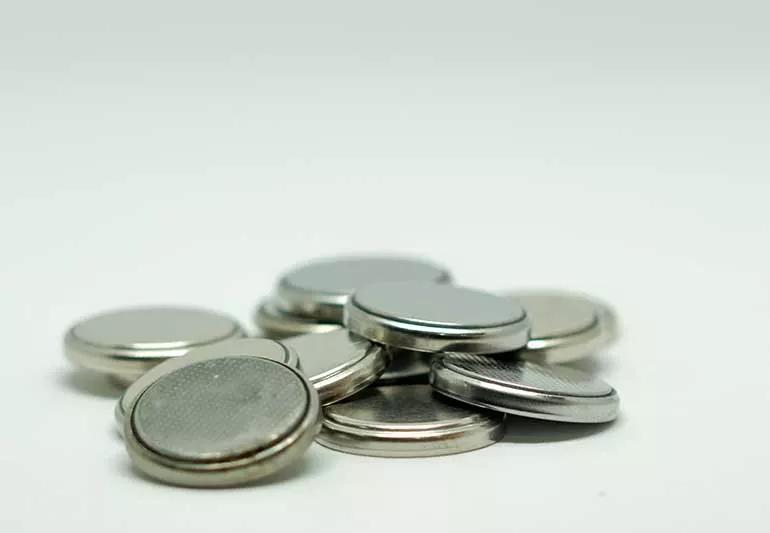These little batteries can do severe damage — go to the ER immediately

Most kids go through that dreaded phase. You know, the one where they put anything and everything into their mouth. Stray Legos®. Dried bits of food. Fuzz.
Advertisement
Cleveland Clinic is a non-profit academic medical center. Advertising on our site helps support our mission. We do not endorse non-Cleveland Clinic products or services. Policy
Sometimes, that curiosity leads children to swallow objects they shouldn’t. According to a recent study, the number of kids under 6 who accidentally swallow foreign objects doubled over the past two decades.
“What they found was that about 800,000 kids — so almost a million kids — came in to the emergency room for foreign body ingestion,” says pediatrician Lisa Diard, MD, who didn’t take part in the study. “And the rate of ingestion was going up, particularly for batteries.”
The study showed that the number of incidents involving the consumption of a button battery rose by more than 90%, which begs the question: What the heck is a button battery?
It’s the coin (or button)-shaped battery powering your watch, your hearing aids, your car keys, and —increasingly — your children’s toys. As these small batteries become increasingly common household items, the number of kids swallowing them (and putting them in other unadvisable places) goes up, too.
That’s bad news. Button battery ingestion is dangerous because the batteries can make holes in the esophagus and intestines, leading to tissue damage and even death.
Nobody can watch their child every second, so it’s important to know the symptoms of button battery ingestion. They include:
Advertisement
Because all of these symptoms can accompany other kinds of illness or injury, be sure you’re keeping track of how many button batteries you own — and store them somewhere safely out of reach.
A child swallowing a button battery is an emergency. Damage to their esophagus can start within hours of consumption, so you need to get them to the nearest emergency room as soon as possible.
Do not induce vomiting.
Do not attempt the Heimlich maneuver.
If your kid is over the age of 1, give them 2 teaspoons of honey every 10 minutes while you make your way to the hospital. A 2018 study demonstrated that honey acts as a “protective esophageal irrigation.” It can’t prevent injury to the esophagus, but it can reduce the severity of the damage. Remember: Honey is extremely dangerous for children under a year old. If an infant swallows a button battery, you shouldn’t give them anything to eat or drink.
If you have any questions or need additional support, call Poison Control (1.800.222.1222) or the National Battery Ingestion Hotline (1.800.498.8666).
According to Dr. Diard, parents need to be aware of what objects in their home contain button batteries, and always keep them out of a child’s reach.
“The number one recommendation made in the study was to make sure that you use some sort of child-proofing device,” Dr. Diard notes. “If you have a button battery in a car key or another device, make sure that it’s really tightly screwed in.”
Toys that use button batteries should only be played with under supervision.
If you need to throw out a button battery, Dr. Diard suggests placing tape on both sides of the used battery and storing it in a secure bag until you’re able to recycle it.
Parents and caregivers should have the number for poison control in their cell phones (1.800.222.1222) so it’s handy at all times.
If you suspect your child has swallowed a foreign object, always call poison control right away, in addition to calling the child’s doctor or 911.
Complete results of the study can be found in Pediatrics.
Advertisement

Sign up for our Health Essentials emails for expert guidance on nutrition, fitness, sleep, skin care and more.
Learn more about our editorial process.
Advertisement

Most babies will crawl between 7 and 10 months old, but later can be normal, too

Adding extra formula, cereal or medications to your baby’s bottle is a dangerous and misguided practice

Teaching your baby to sign may help ease frustrations before they can talk, but it’s not a must-do

Babies can get congested easily, but you can calm their cough by keeping them hydrated, using nasal drops and running a humidifier

Try to burp your baby mid-feed and after they finish eating — but don’t sweat it if they don’t burp

Most babies will recognize their name by about 9 months old

Clean your baby’s mouth with a washcloth or small toothbrush if they have a tooth or you suspect thrush

‘Social smiles’ typically start around 8 weeks old, while laughter comes later — around 4 to 6 months

Even small moments of time outdoors can help reduce stress, boost mood and restore a sense of calm

A correct prescription helps your eyes see clearly — but as natural changes occur, you may need stronger or different eyeglasses

Both are medical emergencies, but they are very distinct events with different causes